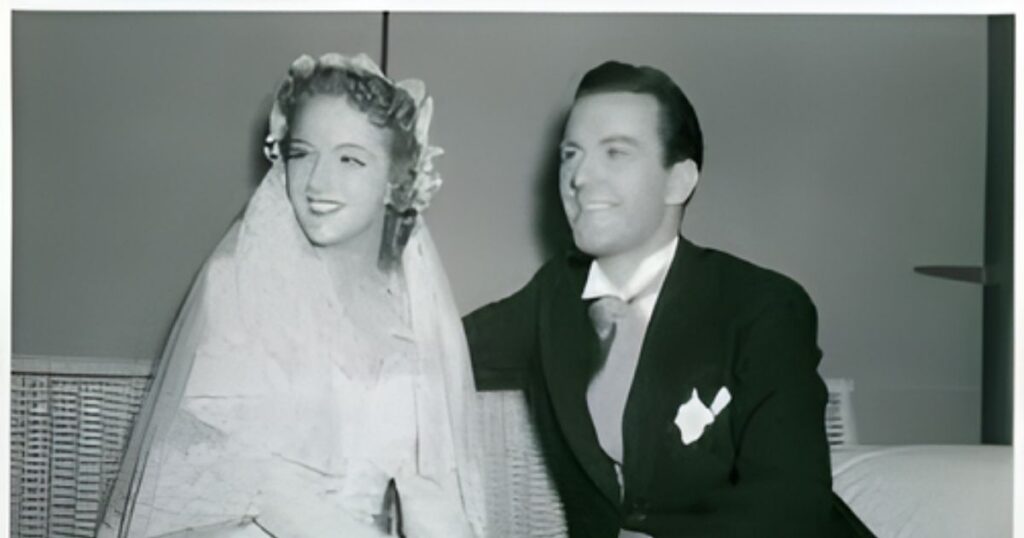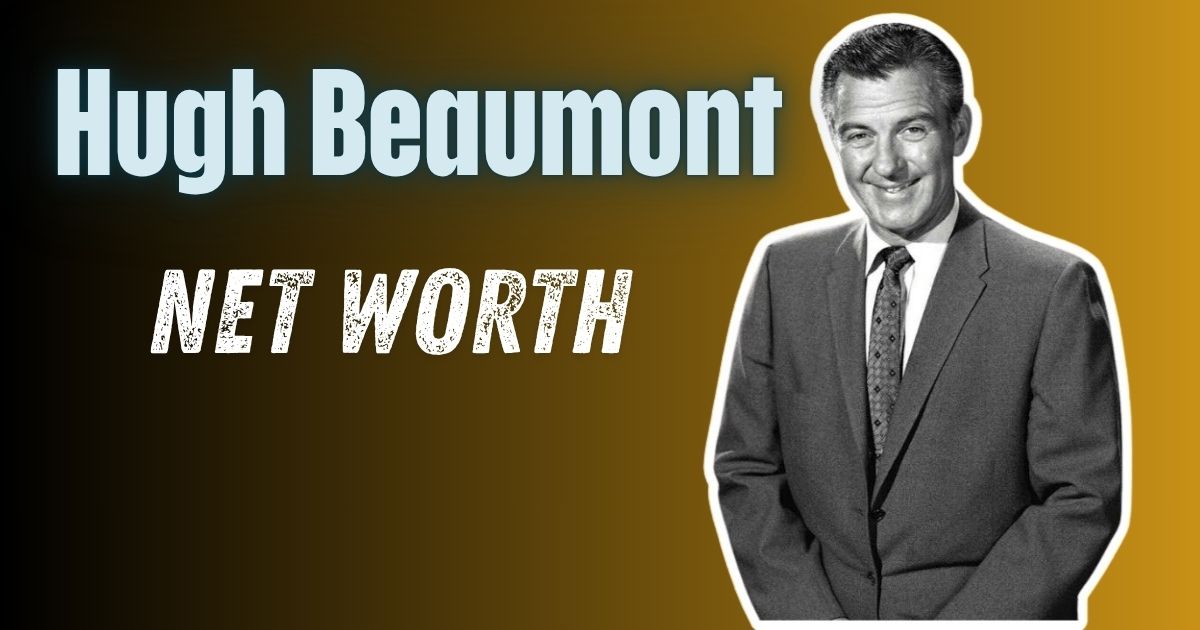Ward Cleaver taught America about family values. But Hugh Beaumont Net Worth real story surpasses fiction. The iconic TV father figure built wealth quietly. His dual life fascinated millions then and now. Eugene Hugh Beaumont balanced Hollywood glamour with Methodist ministry. Few actors achieved this remarkable duality successfully.
The Leave It to Beaver cast member accumulated fortune. His estimated net worth 1982 reached $3 million. That’s roughly $9.5 million today after inflation adjustments. Not bad for a Kansas-born actor who preached. Classic American television actors rarely matched his versatility. His film noir performers background contrasted Ward Cleaver perfectly.
This comprehensive Hugh Beaumont biography reveals everything. We’ll explore his marriage to Kathryn Adams actress. His children’s lives stayed remarkably private always. The entertainment industry 1950s shaped his incredible journey. Let’s uncover the complete truth about this legend.
Quick Info About Hugh Beaumont
| Category | Details |
| Full Name | Eugene Hugh Beaumont |
| Birth Date | February 16, 1909 |
| Death Date | May 14, 1982 |
| Age at Death | 73 years old |
| Birthplace | Lawrence, Kansas, USA |
| Occupation | Actor, Television Director, Writer, Methodist Minister |
| Famous Role | Ward Cleaver in Leave It to Beaver |
| Active Years | 1940-1972 |
| Spouse | Kathryn Adams (m. 1942-1982) |
| Children | Three (Hunter, Kristy, Mark) |
| Height | 6’0″ (183 cm) |
| Education | Master of Theology degree |
Who Was Hugh Beaumont?
Most Americans knew Ward Cleaver intimately and personally. Few understood the man behind that character. Hugh Beaumont represented Hollywood’s most fascinating paradox successfully. He was simultaneously an American actor and Methodist minister. This combination remained extraordinarily rare throughout entertainment history.
Eugene Hugh Beaumont wore multiple hats effortlessly and naturally. Actor, television director, writer, and ordained religious leader. His film noir actors 1940s credentials surprised many. The Blue Dahlia 1946 cast included this versatile performer. The Mummy’s Curse 1944 actor later became wholesome. Classic Hollywood film noir launched his remarkable career initially.
His Midwestern values in entertainment never wavered once. Depression-era experiences shaped his money management philosophy completely. The faith and fame balance he maintained inspired. 20th-century American actors rarely possessed comparable theological credentials. His Master of Theology degree distinguished him permanently. University of Southern California alumni included this unique talent.
Early Life and Family
Lawrence, Kansas molded more than just character here. It forged foundations that never cracked or broke. Born February 16, 1909, Hugh experienced small-town America. His Kansas-born actors background provided authentic groundedness completely. The community emphasized hard work and Methodist faith.
Great Depression influence transformed young Hugh’s worldview dramatically. He witnessed financial devastation destroy families quickly. These lessons about money stuck permanently inside. His parents instilled religious upbringing and moral discipline. The Beaumont household made church attendance mandatory always. Young Hugh absorbed these values thoroughly and permanently.
Small-town values shaped everything he’d eventually become. Neighbors helped neighbors without expecting payment back. This Midwestern upbringing influenced his Hollywood career later. He never forgot where he came from originally. Success wouldn’t corrupt his fundamental character or beliefs. Kansas remained inside him despite California’s bright lights.
Educational Background
Hugh Beaumont pursued learning with uncommon dedication always. His intellectual curiosity extended beyond career preparation alone. Education held intrinsic value for this seeker constantly. Few in Hollywood during the 1940s and 1950s matched him.
He initially attended the University of Chattanooga in Tennessee. Theological studies attracted him even during youth strongly. The spiritual leader within emerged early and clearly. However, practical considerations mattered significantly too here. He later transferred to University of Southern California permanently.
Master of Theology degree achievement distinguished him remarkably. USC School of Theology provided rigorous graduate training thoroughly. He became an ordained Methodist minister officially afterward. This theological studies background enriched his performances dramatically. Directors appreciated working with someone intellectually substantial always. His education and moral philosophy shaped character interpretations profoundly.
Age Height Weight
Physical presence mattered considerably in entertainment industry standards. Hugh Beaumont possessed commanding stature naturally and effortlessly. His appearance projected authority without seeming intimidating overall. Ward Cleaver needed precisely this quality Beaumont embodied.
| Physical Attribute | Measurement | Physical Attribute |
| Height | 6 feet 0 inches (183 cm) | Height |
| Weight | Approximately 180 pounds (82 kg) | Weight |
| Build | Athletic, well-proportioned frame | Build |
| Hair Color | Dark brown (graying naturally) | Hair Color |
| Eye Color | Brown | Eye Color |
| Age at Death | 73 years old | Age at Death |
His Hugh Beaumont age and height suited roles perfectly. He maintained fitness throughout his occupational life admirably. Hollywood excesses that destroyed others never tempted him. His Methodist minister discipline extended to physical health. That self-care contributed significantly to longevity and vitality.
Screen presence radiated quiet confidence always and naturally. Audiences believed him instantly without question ever. His athletic build remained consistent through decades working. Religious actors in Hollywood often maintained better health. His moral character and discipline showed physically too.
Hugh Beaumont Movies and TV Shows
Ward Cleaver overshadowed forty years of diverse work. The Hugh Beaumont filmography revealed unexpected versatility completely. His cinema appearances spanned multiple genres successfully then. Let’s explore this American television history icon’s range.
Film Noir Era (1940s)
Dark alleys and moral ambiguity suited him surprisingly. Film noir performers found steady work during wartime. Beaumont seized opportunities with remarkable determination and skill. Universal Pictures and other studios employed him regularly.
The Mummy’s Curse (1944) launched his horror credentials. He worked alongside Lon Chaney Jr. in this. The Blue Dahlia 1946 cast featured him prominently. Raymond Chandler’s screenplay elevated this crime thriller significantly. Acting opposite Alan Ladd showcased his dramatic abilities.
Railroaded! (1947) demonstrated his noir expertise completely. Anthony Mann’s direction created stark, memorable visuals. Bury Me Dead (1947) mystery thriller followed quickly. The Counterfeiters (1948) crime drama expanded his resume. Money Madness (1948) gave him rare lead opportunity. These roles contrasted his later wholesome image dramatically.
Television Breakthrough
The small screen beckoned during 1950s television family shows. Beaumont recognized this shift early and wisely. Television breakthrough came through anthology series initially. Guest appearances built his solid reputation consistently then.
Racket Squad (1951-1953) featured him in multiple episodes. The Lone Wolf (1954) showcased recurring character work. Various anthology dramas throughout the decade appeared regularly. Directors appreciated his professionalism and preparation always thoroughly.
This transition period proved crucial for career longevity. Film work decreased as television expanded rapidly nationwide. He adapted seamlessly to new medium’s demands. His theatrical training served television acting well perfectly.
Related post: Wutawhacks Columns: Everything You Need To Know
Leave It to Beaver (1957-1963)
Ward Cleaver became America’s idealized father figure instantly. The Leave It to Beaver series revolutionized family programming. CBS and ABC network shows competed for audiences. This classic sitcom fathers archetype influenced generations watching.
Leave It to Beaver episodes totaled 234 across six seasons. The show aired CBS (1957-1958) initially first. ABC picked it up afterward (1958-1963) successfully. Postwar American family television found perfect expression here. The Ward Cleaver legacy established television father standards.
Behind-the-scenes contributions extended beyond acting alone significantly. He directed several episodes during later seasons personally. Leave It to Beaver director credit added income streams. His creative input influenced storylines and dialogue considerably. Television salary 1950s started at $2,500 per episode. This increased to approximately $5,000 eventually later.
Post-Beaver Career
Life continued beyond Mayfield’s picket fences quietly afterward. Petticoat Junction guest star appearances kept him working. My Three Sons guest appearance showcased continuing appeal. Various episodic television throughout 1960s maintained visibility.
Ministry commitments increased over time naturally and gradually. Hollywood opportunities decreased with age predictably and normally. He’d achieved entertainment industry 1950s goals already completely. Spiritual pursuits called louder as years passed. His Hugh Beaumont career timeline wound down intentionally.
The acting and ministry balance shifted toward faith. Final performances came during early 1970s gradually. Retirement allowed focus on religious community work. He’d left indelible mark on American culture.
Hugh Beaumont Wife

Kathryn Adams captured Hugh’s heart during Hollywood golden age. Their Hollywood marriage longevity lasted four decades remarkably. She was accomplished Kathryn Adams actress herself initially. Together they built something rare in show business.
The couple met through entertainment circles during 1941. Kathryn had appeared in several films already. Her credits included “The Wagons Roll at Night” notably. “International Squadron” showcased her dramatic abilities too. She understood performer lifestyle Hugh navigated daily intimately.
They married October 7, 1942, in California ceremoniously. World War II raged everywhere, yet joy prevailed. Kathryn’s decision to prioritize family demonstrated commitment. She stepped back from acting career willingly. Marriage and faith became her primary focus forward.
Kathryn Adams Beaumont contributed significantly to his success:
- Managed household during lengthy filming schedules demanding
- Supported dual ministry-acting career paths chosen uniquely
- Raised three children while he worked extensively
- Maintained stability through entertainment turbulence constantly occurring
- Encouraged creative pursuits beyond acting alone regularly
- Shared Methodist faith in Hollywood strengthened bonds
Their partnership reflected 1940s-1960s values genuinely overall. However, Kathryn possessed intelligence beyond stereotypes completely. She wasn’t merely supportive wife character only. Her accomplishments deserved recognition throughout their partnership. Privacy and family values guided their choices.
After Hugh Beaumont death 1982, she lived quietly. Rare interviews honored boundaries they established together. That discretion reflected values they shared deeply. She passed years later peacefully afterward eventually.
Hugh Beaumont Son Accident
Internet rumors distort truth recklessly and unnecessarily often. Confusion surrounds stories about Hugh Beaumont family life. Let’s clarify facts with respect and accuracy. Hunter Beaumont accident stories lack proper verification completely.
The tragic accident narratives circulating online are exaggerated. Hunter Beaumont (son) survived and lived full life. No fatal car crash claimed him during youth. Hugh Beaumont children grew up away from spotlights. That decision reflected protective father figure values deeply.
Hugh Beaumont son Hunter pursued meaningful careers successfully:
- Psychology and educational counseling professional work
- Lived private life away from Hollywood entirely
- Valued privacy their father established firmly
- Never sought fame through family connection
People assumed home life mirrored Leave It to Beaver. Reality proved more nuanced and genuinely human. Hugh faced challenges like any parent does. His approach emphasized privacy, dignity, protective love. The Hugh Beaumont trivia facts often miss this.
All three childrenHunter, Kristy, Markremained private. Celebrities who were ministers often protected families. This boundary deserves respect from audiences today. Sensationalized stories serve no legitimate purpose here.
What is Hugh Beaumont Net Worth at Death?
Three million dollars in 1982 sounds modest. That’s Hugh Beaumont net worth at death officially. However, inflation-adjusted wealth tells different story completely. Today that equals approximately $9.5 million impressively. Not bad for Methodist minister in Hollywood.
The estimated net worth 1982 came from diverse sources. Leave It to Beaver earnings formed the foundation initially. However, financial success extended far beyond television. Film appearances, directing fees, writing credits contributed. Real estate investments of actors bolstered fortune over time.
Television salary 1950s seems modest now comparatively speaking. Beaumont reportedly earned $2,500 per episode initially. That increased to approximately $5,000 by finale. The series ran 234 episodes total precisely. Simple math reveals impressive cumulative income earned.
Income Breakdown
| Income Source | Estimated Earnings | Income Source |
| Leave It to Beaver (Acting) | $850,000+ | Leave It to Beaver (Acting) |
| Film Roles (1940s-1960s) | $400,000+ | Film Roles (1940s-1960s) |
| Directing Work | $200,000+ | Directing Work |
| Writing Credits | $150,000+ | Writing Credits |
| Residuals & Royalties | $300,000+ | Residuals & Royalties |
His financial prudence demonstrated remarkable wisdom consistently. Depression-era money management shaped his philosophy completely. Entertainment industry offered lucrative opportunities he seized. Yet Methodist background kept materialism at bay. Wealth accumulation never became primary driving force.
Real estate investments provided steady appreciation throughout lifetime. Properties in California and Minnesota appreciated quietly. His fortune grew without ostentatious displays ever. That modest approach reflected religious values deeply. Small-town Kansas upbringing influenced spending habits permanently.
Hugh Beaumont Social Profiles
Hugh Beaumont passed away May 1982 peacefully. Social media didn’t exist during his lifetime. Therefore, no authentic profiles represent him online. Any accounts claiming authenticity are tributes only.
Legitimate resources for information include:
- IMDb – Comprehensive Hugh Beaumont filmography and biography
- Turner Classic Movies – Film history analysis articles
- Wikipedia – General reference with cited sources
- YouTube – Archived Leave It to Beaver episodes available
- Classic TV forums – Fan discussions preserve legacy
Fan communities keep his memory alive actively. The influence on American pop culture remains significant. His wholesome family image endures through syndication. Streaming platforms introduce new generations to Ward Cleaver.
Conclusion
Numbers tell one incomplete story about success. Hugh Beaumont legacy extends far beyond bank accounts. The $3 million net worth represented financial security. But his true wealth lived in authenticity.
This American actor and director achieved remarkable balance. Hollywood and ministry coexisted within one extraordinary man. Ward Cleaver role created lasting cultural impact. Postwar family sitcoms established standards he exemplified. His performances contained genuine wisdom and warmth.
The Hugh Beaumont legacy teaches valuable lessons today. Integrity matters more than fame ultimately always. Family values television shows reflected his actual beliefs. He didn’t act wholesome he lived it. That authenticity resonated across generations watching faithfully.
Ward Cleaver taught lessons outlasting any paycheck earned. His influence on American pop culture remains undeniable. We lost a remarkable man in 1982. But his work lives on through syndication. Classic sitcom fathers still reference his standard today.
Willem Janssen is the admin of Celebrora, a blog dedicated to the world of celebrities. With a passion for entertainment and storytelling, he curates engaging content that brings readers closer to their favorite stars. Willem ensures Celebrora remains a trusted space for fresh updates, insights, and features about the lives of celebrities.

